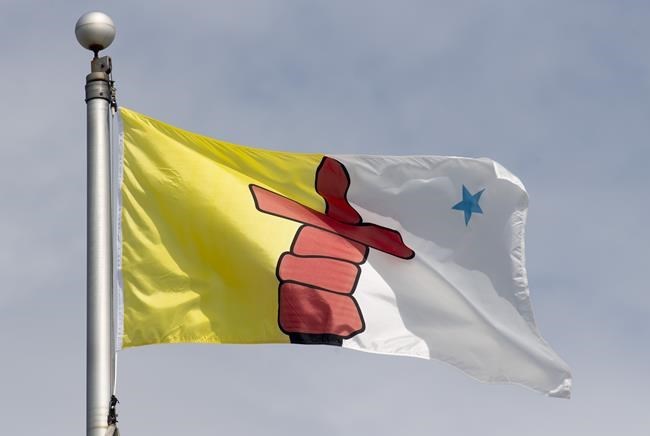IQALUIT, Nunavut — An arbitrator has sided with the organization representing Nunavut Inuit, ruling that plans by the federal and territorial governments to increase Inuit employment in the territory are not meeting commitments in the Nunavut Land Claims Agreement.
Part of the 1993 agreement aims to increase Inuit employment in the public service in Nunavut to levels representative of the territory's Inuit population — 85 per cent.
In a dispute that went to arbitration in 2020, Nunavut Tunngavik Inc., or NTI, argued the governments' plans do not fully comply with that agreement.
In an initial decision, arbitrator Constance Hunt agreed with the Inuit organization. She found the governments' current plans fail to set long-term goals that explain how each department will reach and maintain representative Inuit employment, and they make it difficult to determine how much and where progress has been made.
She also said the Nunavut government's plans fail to use National Occupational Classification codes and do not address regular part-time employment.
"This decision marks a turning point in the lives of Nunavut Inuit and in advancing our social and economic position within the Nunavut Territory and in reminding the governments to comply with their legal obligations under the Nunavut Agreement,” NTI President Aluki Kotierk said in a statement.
“As a society that used to live out on the land, we knew how important every single person is, whatever role they play. And now that we live in communities where far too many Inuit are unemployed, the feeling of being worthless or not having as much value becomes a great burden ... and it eats away at our self-esteem.”
Inuit have been significantly under-represented in the public service in Nunavut, which is the largest employer in the territory. The Nunavut government's rate of Inuit employment has remained around 50 per cent since 2012, while a 2018 report on the Nunavut Inuit labour force stated 40 per cent of federal employees in the territory were Inuit. A federal employee testified during arbitration that it has risen to 48 per cent in recent years.
That report found Inuit representation was the highest in administrative positions and tended to be lower in management, supervisory, scientific and professional roles. It identified family responsibilities, lack of opportunities in people's home communities, health and historical trauma as barriers.
"There are so many things that are involved with having Inuit hired within government and retained and promoted," Marie Belleau, managing legal counsel at NTI, said during a news conference Wednesday. "All of those require active and ambitious steps where it really has to be a priority.
"It is achievable and that was the goal and the steps were already laid out in the Nunavut Agreement back in 1993 when the agreement was signed."
The federal government has prepared nine Inuit employment plans for its departments and a draft of a whole-of-government plan. Nunavut has published 14 plans for its departments and a master plan to have 54 per cent Inuit employment by 2020 and 58 per cent by 2023.
None of those plans set goals for reaching 85 per cent Inuit employment or address how that would be maintained.
The governments argued long-term goals are less reliable and harder to achieve.
Dr. Michael Prince, Lansdowne Professor of Social Policy at University of Victoria, testified during arbitration that under present arrangements he would not anticipate representative employment levels could be achieved before the end of the century.
Belleau said NTI has proposed remedies and now has 60 days to discuss them with the federal and territorial governments. It's a confidential process, she said, and could result in monetary damages.
"We are obviously seeking measures that can improve governments' efforts in achieving adequate Inuit employment plans," she said.
"I think the biggest outcome, biggest positive outcome of this, would be that the obligations are actually fulfilled, so we don't find ourselves years from now again trying to figure out how we can impress upon the governments how important it is to live up to the obligations," Kotierk added.
If the parties fail to come to an agreement, the dispute would go back to arbitration to determine remedies.
The territory did not provide an immediate comment.
Kyle Allen, a representative for Northern Affairs Minister Dan Vandal, said in an email that the federal government is reviewing the arbitrator's decision.
"Increasing Inuit employment remains a priority for our government and we understand its socio-economic impacts, as well as its important role in addressing Inuit self-determination," he wrote. "Our government will continue to work together with partners toward a plan of action."
NTI previously reached a settlement with the federal government in 2015, after filing a lawsuit arguing Canada had failed to meet various promises under the Nunavut Agreement.
Ottawa agreed to provide just over $255 million in compensation, which NTI said it would largely spend on training for Inuit employment. The settlement also allowed for a new dispute resolution process.
This report by The Canadian Press was first published May 10, 2023.
— By Emily Bake in Yellowknife
___
This story was produced with the financial assistance of the Meta and Canadian Press News Fellowship.
The Canadian Press



